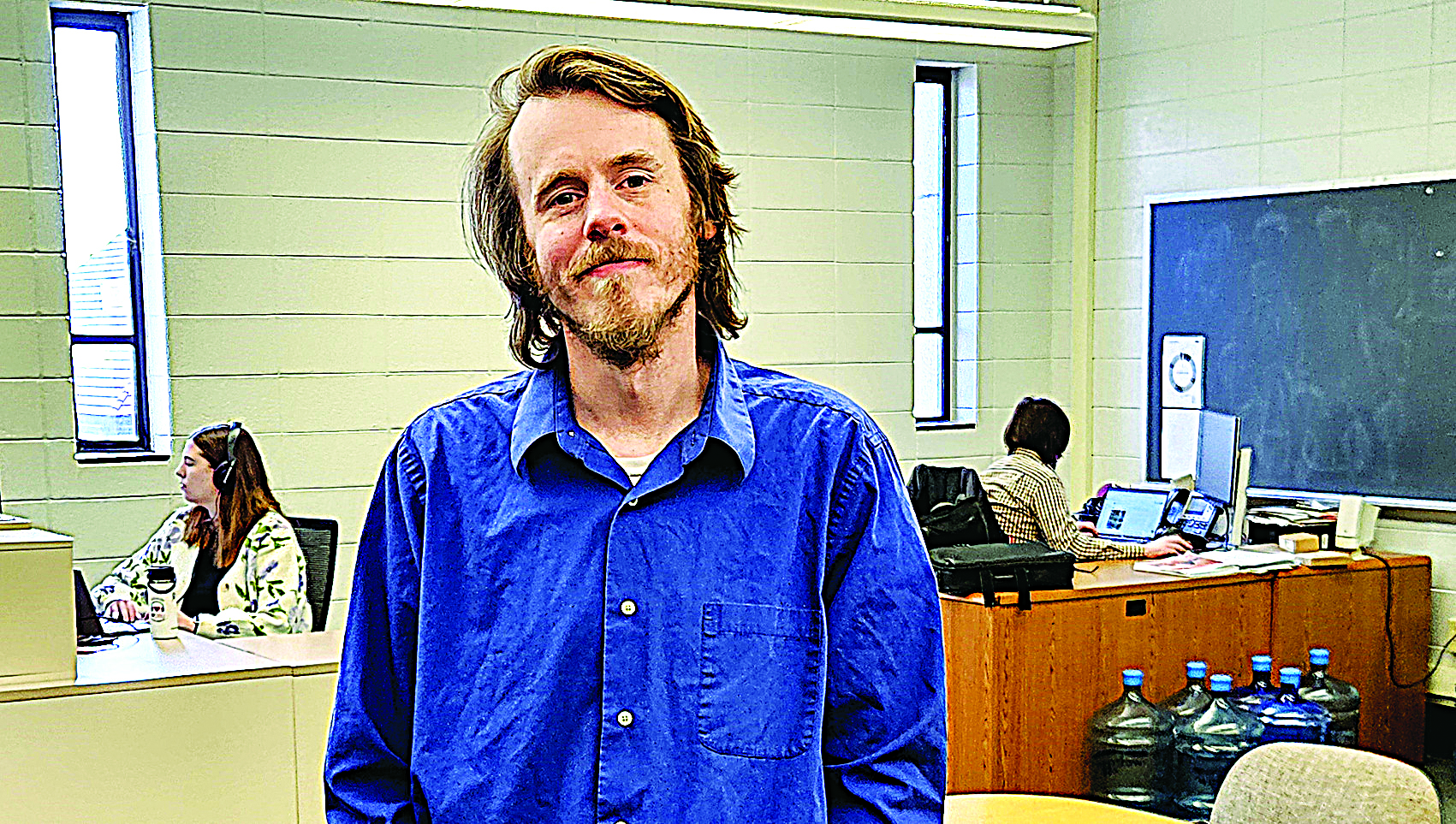
WCBU News Director Tim Shelley in the newsroom with reporters Camryn Cuttinello (left) and Collin Schopp in Morgan Hall at Bradley University.
BILL KNIGHT
On the west side of Bradley University’s campus, the elevator is broken in Morgan Hall, where WCBU-FM 89.9 was moved five years ago. Navigating the four floors to the public radio station’s newsroom and offices is nowhere near the climb the operation faced in 2018. Then, there was a real possibility that the station would go silent as the university was planning to raze its former site in Jobst Hall after former BU President Gary Roberts announced that it was seeking a new partnership for WCBU, citing fiscal concerns.
On the air since 1970, WCBU faced uncertain financial support from Bradley and needed a home. Seeing the uncertainty and appreciating public radio, Illinois State University asked if it could help. An agreement was reached — five years ago this month, when Bradley and ISU arranged for WCBU to continue as a joint service between WCBU and ISU’s WGLT-FM 89.1.
R.C. McBride helped craft the agreement. Executive director/general manager at WCBU and also WGLT-FM 89.1 in Bloomington-Normal, McBride, 50, brought experience to the table.
He started in radio at Danville’s WDAN/WDNL in 1990 as a high school student. In 1997 he worked at Bloomington’s WJBC-AM 1230 as reporter/anchor, play-by-play broadcaster, and talk-show host. McBride won a national Edward R. Murrow Award for best radio newscast in 2002, the year he became WJBC Program Director, where he stayed until 2012, when he went to WGLT.
“The adjustment wasn’t that hard. I went from commercial radio that demanded 40 or 50% profit to public radio, which still has to be smart and cautious in spending, but doesn’t require that kind of return. In some ways, it was a leap of faith,” McBride says. But “we believe in the mission.”
Indeed, he’s on National Public Radio’s Board of Directors.
Intercollege agreement
The arrangement had WGLT’s leadership manage and operate WCBU, but under the ultimate control of Bradley as licensee. The priority in 2019 was to boost local content and cut expenses. WGLT relinquished its Peoria broadcast translator 103.5 to let WCBU-HD2 continue its classical-music programming there; the station moved and hired staff; community support was sustained.
WCBU has had to continually prove itself as a professional, independent news source. Underwriters and listeners wondered about change. Also, though WCBU has always been separate from WTVP-TV 47 (which went on the air a year after WCBU), Channel 47’s previous leadership openly coveted taking over the radio station.
The radio station remains a strong, standalone operation, McBride says.
And independent, adds News Director Tim Shelley, who says neither WGLT nor NPR dictates story assignments, content emphasis or perspectives.
Shelley, 33, is from East Peoria, where he attended Illinois Central College before going to Bradley. After editing weekly newspapers in Tazewell and Woodford counties, he moved to broadcast, becoming assignment editor and later social-media and digital-content manager at WEEK-TV 25 from 2015-2019.
Now, Shelley says he notices a connection with the audience: the public.
“We feel a real engagement with the community,” he says. “People do care.”
The station has an active community advisory board that advocates for listeners and offers ideas and suggestions, Shelley says.
Like most public broadcasting operations, WCBU is non-profit balancing public service and staying in business, so a key is listener membership and underwriting. Fundraising is handled with WGLT, but accounts are separate. And the station tries to focus on its everyday listeners.
Local level
“I’d say our [fundraising] philosophy is more grassroots than targeting big spenders,” McBride says. “We hope listeners start out by giving $5 and grow. It’s not fast; it takes time, but they tend to feel some ‘ownership’ in the station.”
Besides Shelley, WCBU’s newsroom staff includes three full-time journalists (employed by ISU), five part-time correspondents such as ex-Journal Star reporter Steve Tarter and Peoria Chronicle ag writer Tim Alexander, and four student interns, all working on material about Peoria, Tazewell and Woodford counties, which Illinois Public Radio and National Public Radio can use.
The news staff shouldn’t be dismissed as “scrappy” as much as punching above its weight. Arguably, its newsroom is the most reliable news source for central Illinois. Other broadcast newsrooms have cut staff, as has the Journal Star, and The Community Word covers overlooked subjects but comes out monthly. [Full disclosure: The Community Word and WCBU partner on some contents.]
“Some days are super-heavy, requiring an immediacy,” Shelley says. “Other days we may do something else, something lighter but still substantive. We’re not going to do a story on a minor fender-bender.”
Recognizing that stories about public affairs — government, courts, safety, business, etc. — are covered so much less than recent years that the area is becoming a “news desert,” WCBU is increasing coverage outside Peoria, first concentrating on Pekin and Washington but looking at doing more from counties it reaches: Bureau, Knox, Marshall, Mason and Stark.
New age
As with all media, delivery changed, too. Radio isn’t just available from a living-room cabinet, backyard transistor, kitchen counter unit or a car dashboard, with reports limited to the top of the hour. So WCBU has adopted a “digital-first” approach, giving listeners more ways to access content: on phones or computers via Alexa, Spotify, etc.
“We have a good team; we hope everybody stays. But there aren’t as many ‘lifers’ — in all media,” Shelley says. “People go to bigger cities, get different pay, look for bigger opportunities.”
For now, WCBU’s newsroom talents contributed to honors from The Associated Press and the Illinois News Broadcasters Association, the Public Media Journalists Association and the Radio Television Digital News Association, plus back-to-back recognition from the Corporation for Public Broadcasting, which in 2022 and 2023 awarded WCBU the Edward R. Murrow Award for overall excellence in small market radio in Region 7, which includes Illinois, Indiana, Michigan and Ohio.
“What we have is special,” Shelley says.
And a new joint-service agreement lasting through June of 2029 reportedly has been finalized, with Bradley’s formal announcement imminent.
In his office on Morgan Hall’s fourth floor, McBride adds, “We hope the partnership has been a net positive for everybody. I think the public service has improved [and] both stations are able to offer more than they were.”


1 comment for “WCBU gives you news for everyday people”
Recent Comments
We absolutely love WCBU. We donate what we can and were sad to hear they were moving to Bloomington. We had volunteered for quite a few years for pledge drive and other fund raising events. Keep up the good work!